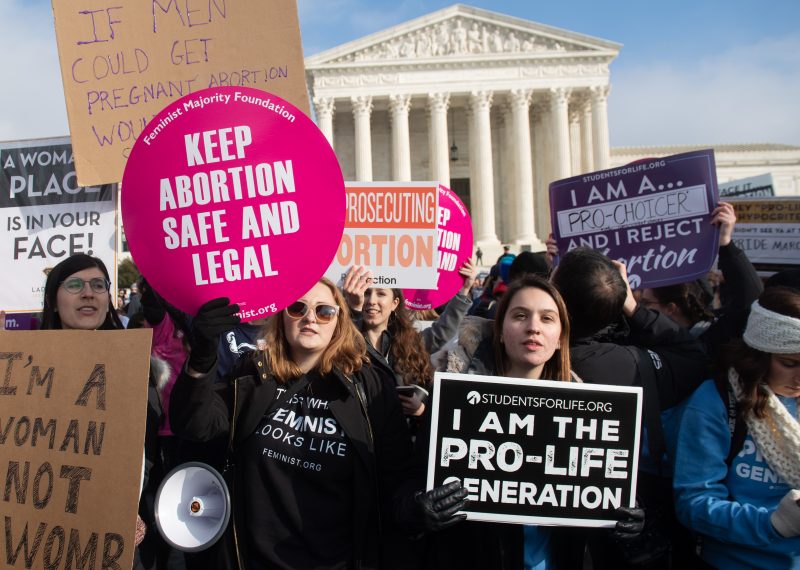Republicans bid for US Supreme Court showdown over abortion
Abortion rights supporters and opponents mark the anniversary of the decision in Roe vs Wade, the 1973 Supreme Court case that legalized abortion in the US (SAUL LOEB)
Washington (AFP) – Republican-led legislatures in state after state are passing bills restricting abortion access in a bid to eventually challenge the 1973 US Supreme Court ruling allowing a woman to terminate a pregnancy.
Opponents of abortion rights are hoping that the moves will prompt the nation’s highest court, which now has a conservative majority, to overturn its landmark decision in the case known as Roe vs Wade.
The latest state to pass abortion restrictions — in fact, the toughest in the entire US — is Alabama, where Republican Governor Kay Ivey on Wednesday signed a bill that places a near-total ban on ending a pregnancy, even in cases of rape and incest.
Under the bill doctors who perform abortions could face between 10 and 99 years in prison.
Ivey said that for now, the law may be unenforceable because of Roe vs. Wade.
But “the sponsors of this bill believe that it is time, once again, for the US Supreme Court to revisit this important matter, and they believe this act may bring about the best opportunity for this to occur,” Ivey said in a statement.
The law is now scheduled to take effect in six months, but it is widely expected to be challenged in court.
Last week, the Republican governor of Georgia signed into law a ban on abortion from the moment a fetal heartbeat is detected. Georgia thus became the sixth US state to outlaw abortion after roughly six weeks of gestation.
Ohio, Mississippi, Kentucky, Iowa and North Dakota have enacted similar laws, while electoral powerhouses Florida and Texas are considering following suit.
All of the state bans have either been blocked by a judge or are headed for the courts, and some of their backers have said — as Ivey mentioned — that they want the issue to go all the way to the nine-member Supreme Court.
The Republican bid to force a showdown over Roe vs Wade comes as President Donald Trump is ramping up for a 2020 re-election campaign with abortion as a hot-button issue.
The Supreme Court has previously reaffirmed a woman’s constitutional right to an abortion, but some anti-abortion activists believe the time may have come to turn the tables.
Since taking office, Trump has appointed two conservative justices — Neil Gorsuch and Brett Kavanaugh — and liberal members of the court are outnumbered five to four.
Conservative-leaning Chief Justice John Roberts is seen as the potential swing vote if the constitutionality of abortion eventually comes before the court.
– ‘Constitutional right’ –
The moves to restrict abortion drew a firestorm of criticism on Wednesday from Democrats.
“This Alabama effort, and the effort across this country now in 29 states, is an all-out attack on women’s reproductive freedom and our basic civil rights,” said New York Senator Kirsten Gillibrand, who is among 22 candidates seeking the 2020 Democratic presidential nomination.
“This is a plan by the Republican Party, make no mistake, to overturn Roe vs Wade and turn back the clock,” Gillibrand told CNN.
Former vice president Joe Biden, who is also seeking to head the Democratic ticket, said Republicans were “ushering in laws that clearly violate Roe v Wade” and should be declared unconstitutional.
“Roe v Wade is settled law and should not be overturned,” Biden said. “The choice should remain between a woman and her doctor.”
“Abortion is a constitutional right,” added Vermont Senator Bernie Sanders, another 2020 hopeful. “What Alabama is doing is blatantly unconstitutional and disrespects the fundamental right a woman has to make decisions about her own body.”
Former first lady Hillary Clinton, the 2016 Democratic nominee, said the abortion bans were “appalling attacks on women’s lives and fundamental freedoms.”
“None of us should accept a future in which our daughters and granddaughters have fewer rights than we do,” Clinton said.
In Ohio, proponents of abortion rights sued the state on Wednesday to challenge the law that would ban the procedure as early as six weeks into pregnancy.
“This is a ban on almost all abortions, and if the court does not block it, it will imperil the freedoms and health of Ohio women,” said Freda Levenson of the Ohio chapter of the American Civil Liberties Union.
“The law of the land has been crystal clear for nearly 50 years: women have a categorical right to a pre-viability abortion.”
In a poll conducted by the Pew Research Center late last year, 58 percent of those surveyed said abortion should be legal in all or most cases while 37 percent said it should be illegal.
Americans were split along party lines, with 59 percent of Republicans saying abortion should be illegal and 76 percent of Democrats saying it should be legal in most cases.
Disclaimer: Validity of the above story is for 7 Days from original date of publishing. Source: AFP.


